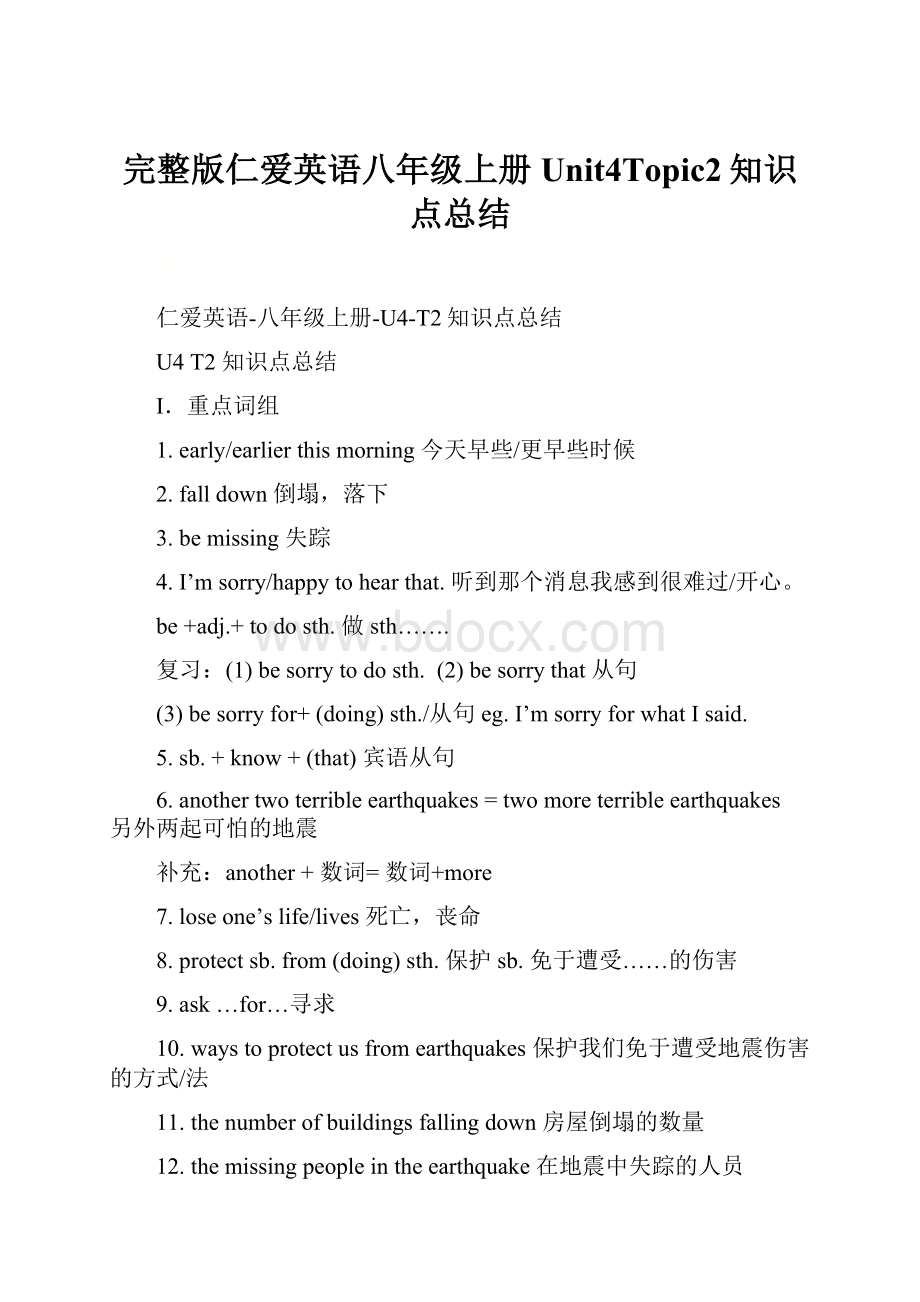完整版仁爱英语八年级上册Unit4Topic2知识点总结.docx
《完整版仁爱英语八年级上册Unit4Topic2知识点总结.docx》由会员分享,可在线阅读,更多相关《完整版仁爱英语八年级上册Unit4Topic2知识点总结.docx(35页珍藏版)》请在冰豆网上搜索。

完整版仁爱英语八年级上册Unit4Topic2知识点总结
仁爱英语-八年级上册-U4-T2知识点总结
U4T2知识点总结
I.重点词组
1.early/earlierthismorning今天早些/更早些时候
2.falldown倒塌,落下
3.bemissing失踪
4.I’msorry/happytohearthat.听到那个消息我感到很难过/开心。
be+adj.+todosth.做sth…….
复习:
(1)besorrytodosth.
(2)besorrythat从句
(3)besorryfor+(doing)sth./从句eg.I’msorryforwhatIsaid.
5.sb.+know+(that)宾语从句
6.anothertwoterribleearthquakes=twomoreterribleearthquakes另外两起可怕的地震
补充:
another+数词=数词+more
7.loseone’slife/lives死亡,丧命
8.protectsb.from(doing)sth.保护sb.免于遭受……的伤害
9.ask…for…寻求
10.waystoprotectusfromearthquakes保护我们免于遭受地震伤害的方式/法
11.thenumberofbuildingsfallingdown房屋倒塌的数量
12.themissingpeopleintheearthquake在地震中失踪的人员
13.mobilephone移动电话
14.takecareofeachother互相照顾
15.waitfor等待
16.preparesth.forsb.为sb.准备sth.
17.stayforabouteighthours等待大约八小时
18.hearabout=hearof听说hear——heardhearfrom收到……的来信
19.alevel7.1earthquake7.1级地震
20.loseone’shome(s)失去某人的家园
21.runoutof…跑出beout…(从……里)出来;没有,缺少
22.howtoprotectyourselvesfromtheearthquake如何保护你们自己免于遭受地震的伤害
疑问词+不定式(todo)可以在句中作主语、宾语和表语
23.forget/remembertodosth.忘记/记得去做sth.
forget/rememberdoingsth.忘记/记得做过sth.
24.stay/keepcalm保持冷静calmdown冷静下来
25.betodosth.
①表义务、应该,接近于should,must等。
②表计划、安排,相当于begoingtodo
26.breakone’srightarm伤到某人的右臂break——broke
27.doanythingelse做其他任何事情
elseadj.其他的,别的(常用在不定代词和疑问词之后)
28.What’sthematterwithsb.?
=What’swrong/thetroublewithsb.?
sb.怎么啦?
29.takealifttogodownstairs乘电梯下楼
30.standinthemiddleofaroom站在房子的中间
31.protectyourheadwithyourarms用双臂保护你的头部
32.sth.happened/happenstosb.sb.发生了sth.
Whathappened/happenstosb.?
sb.发生了什么事情了?
33.behurt/injured受伤
34.beindoors/outdoors在室内/室外
35.thesafestplace最安全的地方
36.sitonthefloorinadoorway坐在出入口的地板上
37.closeto靠近,临近
38.stay/get/keepaway…远离……
39.anythingthatmayfallonyou任何可能砸中你的东西
40.trytodosth.试着去做sth.trynottodosth.试着不去做sth.
41.beoutofdoors在户外
42.movetoclearareas转移到空旷地区
43.becarefulofsth.注意sth.
44.fallenpowerlines掉落的电线
45.beover结束
46.Thereis/aregoingtobe…=Therewillbe…=There’llbe…将有……
47.Itis/wassafeforsb.todosth.对sb.来说做sth.是安全的
48.movearound走动
49.feelafraid感到害怕
50.inafire在火灾中
51.turnoffthegasandlights关掉煤气和灯turnon打开
52.jumpoff=jumpoutof跳出
53.thewholenation=allthenation全国
54.withsb.’shelp…=withthehelpofsb….在sb.的帮助之下
55.rebuildone’shome(s)重建某人的家园
56.returntonormallife返回到正常生活
57.beabletodosth.能够做sth.
58.overagain再次,重新
59.presentsituation现状
60.apieceofnews一则消息/新闻
61.sendthearmytohelp派遣军队去支援
62.indisasterareas在灾区
II.重点句型
1.AterribleearthquakestruckQinghai.
2.I’mverysorrytohearthat.
3.Howcanweprotectourselvesfromearthquakes?
4.Itwasalevel7.1earthquake.
5.IwasverysadwhenIgotthenews.
6.Doyouknowhowtoprotectyourselvesfromtheearthquake?
7.Themostimportantthingistostaycalm.
8.Knowingsomewaystoprotectyourselfwillhelptokeepyousafeinanearthquake.
9.Beverycarefuloffallenpowerlines.
10.Butwiththehelpofthewholenation,peopleinWenchuanarebuildingtheirhomesnowandtheyarereturningtonormallife.
Unit3GettingTogether
Topic1基本句型
1.Excuseme,couldyoupleasetellmeyourname?
Sure,mynameisJane.
2.Couldyouhelpmewithit?
Noproblem.
3.DoeshespeaksomeChinese?
Yes,hedoes./No,hedoesn`t.HespeaksEnglish.
4.Whatdoeshesayintheletter?
5.Jane,SallyandIaregoodfriends.
6.Weoftenhelpeachother.
7.ManystudentsinourclasslikeEnglishalot,butIlikeitalittle.
8.Whataboutyou,Sam?
No,Idon`tlikeEnglishatall.
词组
9.penpal
10.helpsb.withsth.
11.alot
12.not...atall
13.eachother
14.alittle
15.verymuch
16.alotof
17.everyday
人称代词和一般现在时
人称代词代表人或事物,它有人称、单复数、主格和宾格的变化。
第一人称
第二人称
第三人称
主格
I /we
you /you
he/she/it/they
宾格
me /us
you /you
him/her/it/them
1.人称代词的主格和宾格。
(1)主格的人称代词作句子中的主语。
e.g.Wearegoodfriends. 我们是好朋友。
Itismycat. 它是我的猫。
(2)宾格的人称代词作动词或介词的宾语。
e.g.Wealllikeherverymuch. 我们都非常喜欢她。
PleasehelpmewithChinese. 请帮助我学习汉语。
2.实义动词的一般现在时。
实义动词表示动作或状态,在句中能单独作谓语。
在一般现在时中,一般用动词原形,但如果主语是第三人称单数,动词必须用第三人称单数形式。
e.g.IwanttovisittheGreatWall.我想游览长城。
HehelpsmestudyEnglish.他帮助我学英语。
实义动词在一般现在时中用助动词do(第三人称单数用does)构成否定句、疑问句;其答语也用do(does)。
e.g.—DoyoucomefromtheU.S.A.?
你来自美国吗?
—Yes,Ido.是的,我是。
/No,Idon’t.不,我不是。
—DoesheliveinEngland?
他住在英国吗?
—Yes,hedoes.是的,他是。
/No,hedoesn’t.不,他不是。
Whatdoesshesayintheletter?
她在信里说了什么?
Unit3-topic2
基本句型
1、Kangkang,whatdoesyourmotherdo?
Sheisateacher.
2、MariashowsaphotoofherfamilytoKangkang.
3、Wheredoesshework?
Sheworksinahospital.
4、Myfatherworksonafarm.
5、SheteachesEnglishinaschool.
6、ShelikestoplaywithKitty.
1.名词所有格
名词所有格的形式有两种,凡表示有生命的名词(人和动物)通常加“’s”来构成所有格,作定语,放在被修饰的名词之前。
e.g.Kate’steacher凯特的老师,myteacher’sbrother我老师的兄弟,Lily’scat 莉莉的猫,aboy’sball 一个男孩的球,thedog’sname这条狗的名字。
表示无生命事物的名词所有格时,则用由of引出的介词短语来构成,也作定语。
e.g.apictureofaclassroom 一幅教室的图画,adooroftheroom 房间的一扇门。
有时,有生命的名词也可用of结构来表示所有格。
e.g.Whatisthenameofhercat?
=Whatishercat’sname?
她的猫叫什么名字?
注意以s结尾的名词其后只能加’表示所有格。
e.g.Teachers’Day 教师节
另外,若要表示分别所有,则需在每一个名词后均加’s。
e.g.Jane’sandLinda’sfathers简的爸爸和琳达的爸爸
如果表示共同所有,只需在最后一个名词后加’s。
e.g.LucyandLily’sfather 露西和莉莉的爸爸
2.职业
Whatdoeshedo?
他是干什么的?
这是询问职业的一个特殊疑问句,其答语要用职业名称。
还可以这样表达:
What’she?
/Whatishisjob?
e.g.
(1)—Whatdoesshedo?
她是干什么的?
—Sheisadoctor. 她是医生。
(2)—Whatisyourfather?
你父亲是干什么的?
—Heisafarmer. 他是农民。
(3)—Whatdotheydo?
/Whatarethey?
他们是干什么的?
—Theyareworkers. 他们是工人。
3.构词法
最常见的构词法有派生、合成和转化。
(1)派生 在一个单词前面或后面加上一个词缀构成新词。
如:
teach—teacher;act—actor;write—rewrite
(2)合成 由两个或两个以上的词合成一个新词。
如:
class+room classroom,grand+father grandfather,fifty+five fity-five.
(3)转化 一个单词由一种词类转换为另一种词类。
如:
动词转化为名词work(v.工作)—work(n.)著作
4.可数名词变复数的不规则变化
(1)man,woman以及它们的合成词都是把中间的a变为e。
e.g.man—men,woman—women,
salesman—salesmen
(2)oo变为ee。
e.g.foot—feet,tooth—teeth
(3)mouse—mice,child—children
(4)单复数同形。
e.g.aChinese—twoChinese
asheep—twosheep
adeer—twodeer
(5)集体名词总是复数。
e.g.people,clothes,family(指全家人),class(指全班同学)。
集体名词作主语时,谓语动词要与其保持一致。
e.g.Jim’sfamilyareonthesofa. 吉姆一家(坐)在沙发上。
Hisclothesareonthebed.他的衣服在床上。
Unit3-topic3
1、Helpyourselves/yourself(tosomefish)!
2、Wouldyoulikesomeeggs,Maria?
Yes,please./No,thanks.
3、Whatwouldyouliketodrink?
Applejuice,please.
4、Whatdoyouusuallyhaveforbreakfast,Michael?
Iusuallyhavemilkandbreadforbreakfast.
5、MayItakeyourorder,sir?
Fishwithvegetablesandrice,please.
6、Wouldyoulikesomethingtodrink?
Yes.Aglassofapplejuice,please.
7、MayIhelpyou,sir?
8、Whynothavesomefishandeggs?
Goodidea.
9、Theyareallkindtome.
10、I`mverygladtobehere.
1. 名词和数
(1)可数名词
可以用数目来计数的名词叫可数名词。
可数名词一般有单数和复数两种形式。
(2)不可数名词
有些名词不能用具体的数字来表示,我们称其为不可数名词,如rice,milk,meat,water,tea等,不能在其前面直接加数词或a/an,也不能在词尾加s或es,但some和any可直接放在其前面。
e.g.somebread 一些面包, somecoffee 一些咖啡,anywater 一些水
如需同数词连用,可用表示量的名词表示。
即:
数词+表示量的名词+of+不可数名词。
e.g.acupoftea一杯茶,twoglassesofmilk两杯牛奶,
threepiecesofbread 三片面包
2. 动词have表示“吃”,“喝”的意思。
e.g.havesomerice 吃米饭, havedinner 吃饭,
havetea 喝茶
Whatdoyouwanttohave?
你想吃/喝点什么?
meal 饭,餐
Breakfast 早餐
Lunch 午餐
Supper 晚餐
Brunch 早午并餐
Dinner 正餐
3.wouldlike表示“要,想要”,相当于want,但比want语气更委婉。
它的结构通常是wouldlikesth.想要某物。
wouldlike(sb.)todosth.想(让某人)做某事。
e.g.Iwouldlikesomeapples. 我想要些苹果。
Iwouldliketogothere. 我想去那儿。
Wouldyoulike...?
你想要……吗?
表示客气地提出请求或建议。
肯定回答:
Yes,please./Sure.
否定回答:
No,thanks./thankyou.
Wouldyouliketodosth.?
你想去做某事吗?
也表示向对方提出请求或建议等。
肯定回答:
Yes,I’dlove/liketo.
【重点短语和句型】
1. Couldyouplease+动词原形……?
用来表示委婉的请求
---Couldyoupleasetellmeyourname?
---Sure/Noproblem.My nameisSally.
---Sorry.
2. tell sb.sth.=tellsth.to sb.告诉某人某事
tellsb.about sth.告诉某人关于某事
Pleasetellmeyourname.=Pleasetellyournametome.
PleasetellMariaaboutit.请把这件事告诉玛丽亚吧。
3. help sb.do sth.=helpsb.with sth.在某方面帮助某人,帮助某人做某事
Pleasehelpusfindhim.
Couldyoupleasehelpme with English?
=Couldyoupleasehelpmestudy English?
4. want todosth.=wouldliketodosth.想要做某事
wantsth.=wouldlikesth.想要某物
wantsb.todosth. 想要某人做……
Hewants tovisit Beijing.=Hewouldliketovisit Beijing.
Iwant/wouldlikeanorange.
JanewantsKangkangtosing somesongswith her.
5. show sth.tosb.=showsb.sth.把某物展示给某人看
Mariashowsaphotoofherfamily to Kangkang.
6. MyEnglishisverygood.=Icanspeak Englishverywell.
7. live in+地点 居住在某地
livewith+sb. 和某人住
HeliveinChinawithhisparents.
8. know alotabout……知道许多关于……的事
HeknowsalotaboutChina.
9. say表示说话的内容,speak表示说某种语言的能力
Whatdoeshesay intheletter?
Hecanspeak someEnglish.
10. 对事物的喜欢程度
like……verymuch/alot非常喜欢
like……alittle有点喜欢
don’tlike……atall 一点都不喜欢
ManystudentsinourclasslikeEnglish alot,butIlikeitalittle.
Hedoesn’t likechocolate atall.
11. alotof+可数名词复数/不可数名词
Ihavealotof Englishbooks.
12. every day每天
eachother相互
someofthem他们中的一些
eatout下馆子,到外面吃饭
13. playwith sb.和某人一块玩耍
liketodo/doing sth.喜欢(做)某事
Shelikestoplaywith Kitty.
14. Helpyourself/yourselvestosth.随便吃(喝)……
15. be kindtosb.对某人很友好
Theyareallkindto me.他们对我很友好。
It’sverykindofyou.你真好。
16. begladtodosth.很高兴(乐意)做……
Iamverygladtobehere.我很乐意在这里。
Gladtomeetyou.很高兴见到你。
17. letsb.do sth.让某人做某事
Letmesee.让我想一想。
Letushelpyoufindhim.让我们帮助你找到他。
18. Iamhome.我到家了。
Mariaisn’tathome/innow.玛丽亚现在不在家。